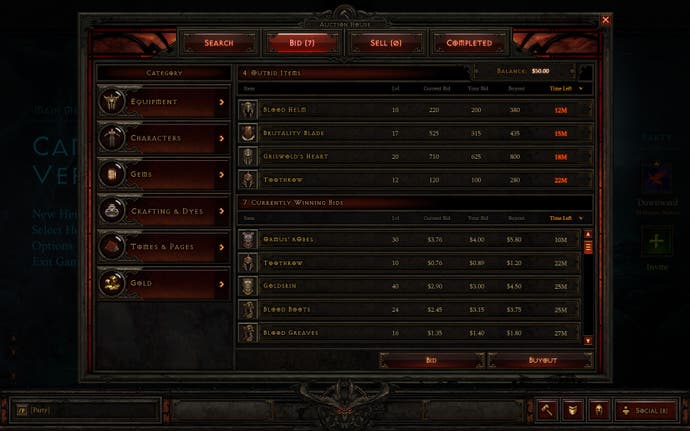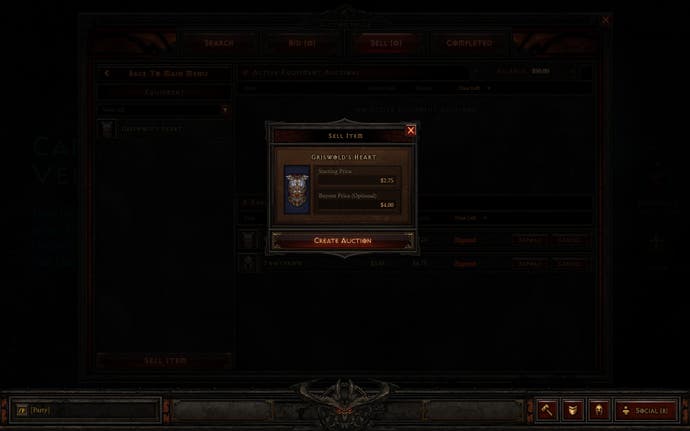The How and Why of the Diablo 3 Auction House
An in-depth look at the first official real money market.
Crucially, Blizzard will not sell items directly through the auction house, or any other in-game store. Everything available to buy will have to be found in the game by players. "We want it to be completely player-driven. This is all about facilitating player trading," states Pardo. "Which is very different to, let's say, a lot of the micro-transaction models in Asia where the company itself is selling you the items."
Transactions through the auction house will be completely anonymous in order to eliminate the unpleasant social dynamics associated with player trading, and because, as Wilson puts it, "every seller is equal" in a virtual auction house where every transaction is guaranteed to complete instantly, automatically and safely. "eBay's an honour system. There's no honour here. If you sell an item and someone buys it, they're going to get it... There's no such thing as a good seller and a bad seller."
Auction houses will be segregated by region and by currency. You'll be able to trade in other currencies within your region, but not outside your region; for example, British players can choose to buy items in euros rather than sterling, but can't buy them in US dollars from the North American auction house. Blizzard expects most players will stick to their own currency to avoid foreign transaction fees.
That's how the Diablo III auction house will work. But how does Blizzard defend the move to its critics? And is it really the beginning of the end?
The debate
Blizzard's basic rationale for allowing real money trading - which can be summarised as 'players will do it anyway, so we may as well provide a secure avenue for it (and get our cut)' - isn't quite the whole story. If it were, the company would be planning a similar service for World of Warcraft, which supports a massive black market in game gold. But we're explicitly told that this isn't on the cards.
"I don't think you would ever want to put this system in World of Warcraft [because WOW's item game is] not a trading system, it's a prestige system," says Wilson. He means that the very best items in WOW are obtained from, and emblems of, success in raiding or player-versus-player, and they can't be traded. "Doing something like a real money auction house in World of Warcraft would be highly damaging to the game design, so we would not do it there."
Pardo argues that player trading suits Diablo's randomised and unrestricted item game much better. More than suits it - is inherent to it. "I really do think a real money auction house like this is integrated into the game design of how the Diablo item system works," he says. "To really get the very best items, or the items that are most suited to you, oftentimes you'll have to trade around. And I think that adds a really interesting dynamic to the metagame."

Blizzard constantly reiterates the idea that Diablo is "a game about trading" (Wilson's words), that its design both encourages and benefits from players trading items with each other. Not all Diablo players would share this view - perhaps because the previous games segregated online and solo play, so a large proportion of players never encountered the trading culture.
That said, it's clearly true that the Diablo item game can support a player-driven "merchant economy", as Pardo puts it. Many players enjoy participating in trade in Diablo II, despite the risks and impracticalities. On that basis, an integrated in-game trading system for a modernised, online-focused Diablo game is a no-brainer.
But why does it have to have a real currency option? This is the question asked by gamers who feel that paying real money for a shortcut to quality items - items you'd otherwise have to grind to get (or grind to get gold to pay for) - cheapens both the game design and their own, hard-won achievements within it.

It's hardly an instant-win button - items are restricted by character level, so you'll still need to put the hours in to be able to wear the best bling. Nonetheless, Pardo readily admits that Blizzard is servicing the growing number of players who want to buy game advancement for cash.
He argues that the auction house model, as opposed to a "Freemium" item store, levels the playing field, because the players who don't believe in this style of play will literally profit from those that do. "Some players really do want to use real world money to get some amount of advancement within games. Some people really want the time investment... On the seller side, if I'm really elite within the game and I spend a lot of time in the game, then I can get benefits directly out of that."
That being the case, in a game squarely focused on co-operative play, where's the harm? It's a fair question, and most of the complaints are emotive or subjective ones with no particular bearing on the game balance. Of course, this isn't true of the game's team deathmatch Versus mode, where spending money on gear will clearly be the quickest route to success.
